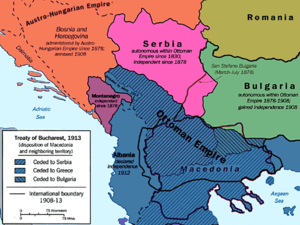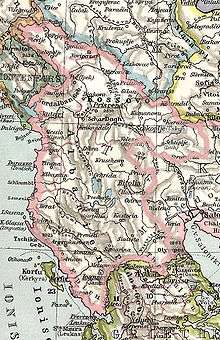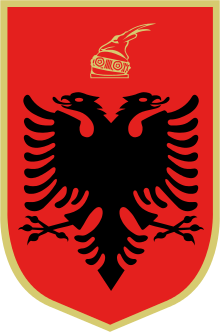Albanian Vilayet
The Albanian Vilayet (Ottoman Turkish: ولايت ارناود, Vilâyet-i Arnavid) was a projected vilayet of the Ottoman Empire in the western Balkan Peninsula, which was to include the four Ottoman vilayets with substantial ethnic Albanian populations: Kosovo Vilayet, Scutari Vilayet, Manastir Vilayet and Janina Vilayet. At times it included the Salonica Vilayet too.[1][2][3] The creation of the Vilayet was confirmed in September 1912, but negotiations were interrupted a month later in October with the beginning of the First Balkan War. Plans for an Albanian Vilayet were lost with the Partition of Albania.
A separate Albanian super-vilayet was a part of the agenda of many Albanian organizations and societies since 1877, during the period known as the Albanian National Awakening. Establishment of such a vilayet was agreed between the Albanian rebels and the authorized representatives of the Ottoman government on September 4, 1912, following the Albanian Revolt of 1912. Soon after that agreement however, the First Balkan War broke out and most of the remaining European territory of the Ottoman Empire was occupied by the Balkan League member states. After the army of the Kingdom of Serbia captured Skopje, Ismail Qemali invited a group of Albanians from the all four Ottoman vilayets that were agreed to be united into the Albanian Vilayet, to attend an All-Albanian Congress in Valona. There they declared independence on November 28, 1912 and set up the Provisional Government of Albania.
The same territories were claimed by those nations living in that region that had already risen their national development to independent statehood: Shkodër vilayet was claimed by the Serbs and Montenegrins, Kosovo vilayet by the Serbs, Montenegrins and Bulgarians, Monastir vilayet by the Serbs, Greeks and Bulgarians and Janina Vilayet by the Greeks.[4] A few weeks after the beginning of the First Balkan War, the biggest part of the territories intended for the Albanian Vilayet was in the hands of Balkan League member states, as a condominium.[5] Final frontiers between the Balkan League members and the new Principality of Albania were decided by the treaties of London and Bucharest, and ignored the frontiers of the proposed Albanian Vilayet, leaving substantial Albanian populations living outside the newly established Albanian nation-state.
Events
Central Committee for Defending Albanian Rights
The Central Committee for Defending Albanian Rights was organization established in the city of Istanbul, Turkey, then Ottoman Empire in 1877 by an influential group of Albanian intellectuals, patriots, and politicians, such as Sami Frashëri, Pashko Vasa, Abdyl Frashëri and many others.[6] The chairman of the Committee was Abdyl Frashëri.[6]
This Committee published the idea for uniting the vilayets of Monastiri, Scutari, Kosovo and Janina) into one Albanian vilayet in the paper Tercüman-ı Hakikat.[7] Contrary to what is often said, a claim for territories very often included the Salonica Vilayet too.[2][8]
League of Prizren 1878
The League of Prizren was an Albanian political organization founded on 10 June 1878 in Prizren, in the Kosovo province (vilayet) of the Ottoman Empire. The initial position of the league, based on the religious solidarity of the landlords and the people connected with the Ottoman administration and the religious authorities, was reason for naming the league — The Committee of the Real Muslims (Albanian: Komiteti i Myslimanëve të Vërtetë)[9] On the first meeting of the league was written decision memorandum (kararname) that said nothing about the reforms, nothing about the schools, nothing about the autonomy or about the union of the Albanian population within one vilayet.[10]
Soon after the first meeting of this organization it adopted a new agenda, under the influence of Abdyl Frashëri, that included establishing of the Albanian Vilayet.[11] It was not an appeal for Albanian independence, or even autonomy within Ottoman Empire but, as proposed by Pashko Vasa, simply the unification of all Albanian speaking territory within one vilayet.[12]
Tercümân-i-Şark (English: The Oriental Interpreter) (newspapers which provided detailed coverage about events in Albanian populated area), in which Sami Frashëri was member of the staff, reported about the events in the Albanian populated area (Turkish: Arnavudluk) and about the unionist society (Turkish: cemiyet-i ittihadiye) established by the delegates of League of Prizren.[13]
League of Peja 1899
The League of Peja (Albanian: Lidhja e Pejës) was an Albanian political organization established in 1899 in the city of Peć (Peja), Kosovo. It was led by Haxhi Zeka, a former member of the League of Prizren and shared the same platform in quest for an autonomous Albanian vilayet within Ottoman Empire. There were two groups of members. The first group of conservative and more moderate members wanted five vilayets (with Salonica Vilayet included) to be united into the Albanian vilayet, and the second group of the more radical members wanted full administrative autonomy for the four vilayets united in the Albanian vilayet.[3]
Albanian Revolt of 1912
.svg.png)
The Albanian Revolt of 1912 was one of many Albanian revolts in the Ottoman Empire and lasted from January until August 1912. The revolt started in the western part of Kosovo vilayet[15] and was led by Hasan Pristina, Nexhip Draga, Bajram Curri, Riza Bey and others.[16] Hasan Prishtina who was in the Kosovo vilayet during the revolt, and Ismail Qemali who was in Europe gathering weapons and money and attempting to win over European public opinion to the cause of the uprising, maintained communication through the British Consulate in Skopje.[17] Essad Pasha Toptani obliged himself to organize the uprising in Central Albania and Mirdita.[18]
After a series of successes, Albanian rebels managed to capture the city of Skopje, the administrative centre of Kosovo vilayet within the Ottoman rule.[19][20][21] The revolt ended when the Ottoman government agreed to accept all demands (ignoring only last one, court martial for Ottoman officers who attempted to suppress revolt) on September 4, 1912.[22]
List of accepted demands
On August 9, 1912 Albanian rebels presented new list of demands (so called list of Fourteen Points) related to the Albanian vilayet that can be summarized as follows:[23]
- autonomous system of administration and justice
- Albanians to perform military service only in territory of the four vilayets, except in time of war
- employing the officials knowing local language and customs, but not necessarily Albanians,
- establishment of new licees and agricultural schools in the bigger districts
- reorganization and modernization of the religious schools and use of Albanian language in secular schools
- freedom to establish private schools and societies
- the development of trade, agriculture and public works
- general amnesty for all Albanians involved in revolt
- court martial for those Ottoman officers who attempted to suppress revolt
The Ottoman government ended the Albanian revolts by accepting all demands (ignoring only last one) on September 4, 1912.[22] Hasan Prishtina was planning to start new revolt in three or four months, because his main goal was not autonomy but independence of Albanian Vilayet, but the First Balkan War broke out soon and destroyed his plans.[24]
First Balkan War

When the First Balkan War broke out, members of the Balkan League captured most of the territory that was promised to be Albanian Vilayet in period September—December 1912. Balkan allies planned the partition of the European territory of the Ottoman Empire among them and in the meantime the conquered territory was agreed to have status of the Condominium.[5] The final fate of the captured territory was to be decided by the Treaty of London and Treaty of Bucharest.
Albanian Declaration of Independence
When the army of Kingdom of Serbia won Battle of Kumanovo and seized the Skopje and when the Bulgarian army captured Kırk Kilise, at the beginning of the First Balkan War, Ismail Qemali decided to send telegrams to Albanians from the Albanian Vilayet to come to congress to Valona on November 28, 1912.[25] They declared independence and set up a provisional government.[26]
Treaties of London and Bucharest

The Treaties of London and Bucharest dealt with the territorial adjustments arising out of the conclusion of the Balkan Wars.[27] The frontiers of the newly established Principality of Albania covered only the portion of the territory of Albanian vilayet while its biggest part become the part of the Slavic states.[28] The Kingdom of Bulgaria lost the conquered parts of the Albanian vilayet during the Second Balkan War.[29]
See also
- Albanian National Awakening
- Albanian Revolt of 1912
- Ismail Qemali
- Hasan Prishtina
- First Balkan War
- Independent Albania
References
- ↑ Clayer, Nathalie (2007). Aux origines du nationalisme albanais: la naissance d'une nation majoritairement musulmane on Europe. Karthala. p. 463. ISBN 978-2-84586-816-8. Retrieved January 19, 2011.
Contrairement à ce qui est souvent affirmé, la revendication d'un territoire englobant le vilayet de Salonique fut assez fréquente
- 1 2 Bataković, Dušan T. "The Albanian League". The Kosovo Chronicles. Belgrade, Serbia: Knižara Plato. ISBN 86-447-0006-5. Archived from the original on January 19, 2011. Retrieved January 19, 2011.
Plans were then already voiced for including even of the Salonika vilayet
- 1 2 Jelavich, Charles; Jelavich, Barbara (1986). The establishment of the Balkan national states, 1804–1920. University of Washington Press. p. 86. ISBN 978-0-295-96413-3.
The first, more moderate, wanted the five vilayets (this would include Thessaloniki) that were inhabited by Albanians to be united in the single province ... plan receives support of the conservatives. The more radical group desired unification of just four vilayets, but with full administrative autonomy
- ↑ Sellers, Mortimer; Tomaszewski, Tadeusz (2010-04-15). Sellers, Mortimer; Tomaszewski, Tadeusz, eds. The Rule of Law in Comparative Perspective. London: Springer Dordrecht Heidelberg. p. 202. doi:10.1007/978-90-481-3749-7. ISBN 978-90-481-3748-0. Retrieved January 19, 2011.
However, the same regions were also claimed by those nations living in area that had started their national developments and risen to nation statehood level somewhat before Albanians. The vilayets of Shkodra (part of present Albania) and Kosovo (an independent state now) were claimed by Serbs and Montenegrins, Monastir by Serbs and Bulgarians and Ioaninna by the Greek.
- 1 2 Redlich, Josef; d'Estournelles, Baron; Godart, M. Justin; Shucking, Walter; Hirst, Francis W.; Brailsford, H. N.; Milioukov, Paul; Dutton, Samuel T. (1914). "Report of the International Commission to Inquire into the Causes and the Conduct of the Balkan Wars". Washington D.C.: Carnegie Endowment for International Piece. p. 49. Retrieved January 10, 2011.
In a few weeks the territories of Turkey in Europe .. by the Balkan allies ... in their hands as condominium
- 1 2 Elsie, Robert (January 2006). Albanian literature: a short history. I. B.Tauris & Company, Limited. pp. 75–76. ISBN 1-84511-031-5.
- ↑ Bataković, Dušan T. "The Albanian League". The Kosovo Chronicles. Belgrade, Serbia: Knižara Plato. ISBN 86-447-0006-5. Archived from the original on January 19, 2011. Retrieved January 19, 2011.
The plan of the Committee, published in the Tercuman - i Sark paper, anticipated the founding of a single Albanian vilayet that would encompass the Kosovo, Bitolj, Scutari and Janjevo vilayets.
- ↑ Clayer, Nathalie (2007). Aux origines du nationalisme albanais: la naissance d'une nation majoritairement musulmane on Europe. Karthala. p. 463. ISBN 978-2-84586-816-8. Retrieved January 19, 2011.
Contrairement a ce qui est souvent affirme, la revendication d'un territorie englobant le vilayet de Salonique fut assez frequente
- ↑ Kopeček, Michal; Ersoy, Ahmed; Gorni, Maciej; Kechriotis, Vangelis; Manchev, Boyan; Trencsenyi, Balazs; Turda, Marius (2006). Discourses of collective identity in Central and Southeast Europe (1770–1945). 1. Budapest, Hungary: Central European University Press. p. 348. ISBN 963-7326-52-9. Retrieved January 18, 2011.
The position of the League in the beginning was based on religious solidarity. It was even called Komiteti i Myslimanëve të Vërtetë (The Committee of the Real Muslims) ... decisions are taken and supported mostly by landlords and people closely connected with Ottoman administration and religious authorities..
- ↑ Gawrych, George Walter (2006). The crescent and the eagle: Ottoman rule, Islam and the Albanians, 1874–1913. London: I.B. Tauris. pp. 46–47. ISBN 1-84511-287-3.
a 16 point "decision memorandum" (kararname) said nothing about reforms, schools, autonomy, nothing even about the unification of the Albanian lands in one vilayet
- ↑ Kopeček, Michal (2007). Discourses of collective identity in Central and Southeast Europe (1770–1945). 2. Budapest, Hungary: Central European University Press. ISBN 963-7326-60-X. Retrieved January 18, 2011.
Soon after this first meeting, ... mainly under the influence of ... Abdyl Frashëri ... new agenda included ... the fonding of an autonomous Albanian Vilayet
- ↑ Elsie, Robert (2005). Albanian literature: a short history. London: I.B. Tauris in association with the Centre for Albanian Studies. p. 82. ISBN 1-84511-031-5. Retrieved January 18, 2011.
Far from an appeal for Albania independence, or even autonomy within empire, Pashko Vasa proposed simply the unification of Albanian speaking territory within one vilayet, and a certain degree of local government
- ↑ Gawrych, George Walter (2006). The crescent and the eagle: Ottoman rule, Islam and the Albanians, 1874–1913. London: I.B. Tauris. pp. 46–47. ISBN 1-84511-287-3.
Tercümân-i-Şark, which had Shamseddin Sami on its staff, provided detailed coverage of events in Albania. The paper reported that Albanians from all over Albania (Arnavudluk) ... the delegates established a unionist society (cemiyet-i ittihadiye).
- ↑ "Ben Cahoon". worldstatesmen.org. 2000.
- ↑ Elsie, Robert (2004). Historical dictionary of Kosova. United States of America: Scarecrow Press Inc. p. xxx. ISBN 0-8108-5309-4.
1912 spring: beginning of uprising in many parts of western Kosova
- ↑ Bogdanović, Dimitrije (November 2000) [1984]. "Albanski pokreti 1908–1912.". In Antonije Isaković. Knjiga o Kosovu (in Serbian). 2. Belgrade: Serbian Academy of Sciences and Arts. Archived from the original on 31 January 2011. Retrieved January 9, 2011.
Na čelu ustanka u kosovskom vilajetu bili su Hasan Priština, Nedžib Draga, Bajram Curi, Riza-bej i dr.
- ↑ Prishtina, Hasan. Nji shkurtim kujtimesh mbi kryengritjen shqiptare të vjetit 1912. Shkrue prej Hassan Prishtinës [Hasan Bey Prishtina: Brief Memoir on the Albanian Uprising of 1912] (Translated by Robert Elsie) (in Albanian). Shkodra: Shtypshkroja Franciskane. Archived from the original on January 10, 2011. Retrieved January 10, 2011.
Ismail Kemal was ... staying in Europe to help gather weapons and money and to win over European public opinion ... agreed to keep in contact through the British Consulate in Skopje.
- ↑ Prishtina, Hasan. Nji shkurtim kujtimesh mbi kryengritjen shqiptare të vjetit 1912. Shkrue prej Hassan Prishtinës [Hasan Bey Prishtina: Brief Memoir on the Albanian Uprising of 1912] (Translated by Robert Elsie) (in Albanian). Shkodra: Shtypshkroja Franciskane. Archived from the original on January 10, 2011. Retrieved January 10, 2011.
Essad Pasha assured us that he could manage things in Central Albania and Mirdita.
- ↑ Bogdanović, Dimitrije (November 2000) [1984]. "Albanski pokreti 1908–1912.". In Antonije Isaković. Knjiga o Kosovu (in Serbian). 2. Belgrade: Serbian Academy of Sciences and Arts. Archived from the original on 31 January 2011. Retrieved January 9, 2011.
ustanici su uspeli da slomiju otpor turske armije, da ovladaju celim kosovskim vilajetom do polovine avgusta 1912, što znači da su tada imali u svojim rukama Prištinu, Novi Pazar, Sjenicu pa čak i Skoplje
- ↑ Phillips, John (2004). "The rise of Albanian nationalism". Macedonia: warlords and rebels in the Balkans. London: I.B. Tauris. p. 29. ISBN 1-86064-841-X.
An Albanian uprising in Kosovo for independent schools in May 1912 led to capture of Skopje by rebels in August
- ↑ Bahl, Taru; M.H. Syed (2003). "The Balkan Wars and creation of Independent Albania". Encyclopaedia of the Muslim World. New Delhi: Anmol publications PVT. Ltd. p. 53. ISBN 81-261-1419-3.
The Albanians once more raise against Ottoman Empire in May 1912 and took Macedonian capitol of Skopje by August
- 1 2 Shaw, Stanford J.; Ezel Kural Shaw (2002) [1977]. "Clearing the Decks: Ending the Tripolitanian War and the Albanian Revolt". History of the Ottoman Empire and modern Turkey. 2. United Kingdom: The Press Syndicate of University of Cambridge. p. 293. ISBN 0-521-29166-6. Retrieved January 10, 2011.
Therefore, with only final point being ignored, on September 4, 1912 the government accepted proposals and the Albanian revolt was over
- ↑ Shaw, Stanford J.; Ezel Kural Shaw (2002) [1977]. "Clearing the Decks: Ending the Tripolitanian War and the Albanian Revolt". History of the Ottoman Empire and modern Turkey. 2. United Kingdom: The Press Syndicate of University of Cambridge. p. 293. ISBN 0-521-29166-6. Retrieved January 10, 2011.
- ↑ Prishtina, Hasan. Nji shkurtim kujtimesh mbi kryengritjen shqiptare të vjetit 1912. Shkrue prej Hassan Prishtinës [Hasan Bey Prishtina: Brief Memoir on the Albanian Uprising of 1912] (Translated by Robert Elsie) (in Albanian). Shkodra: Shtypshkroja Franciskane. Archived from the original on January 10, 2011. Retrieved January 10, 2011.
I told the honoured gentlemen that we would organise another uprising in three or four months' time and would then declare independence ... the Balkan War soon broke out, which destroyed all of our plans.
- ↑ Qemali, Ismail (1920) [1920]. "Time to act". In Sommerville Story. The Memoires of Ismail Kemal Bey. William Morton Fullerton. London: Constble and Company Limited. pp. 369, 370. Retrieved January 21, 2011.
.. Bulgarian army were in occupation of Kirk-Kilisee and Serbs had seized Uskub ... , I realised that the time had come for us Albanians to take vigorous measures ... I arrived at Bucharest .. I telegraphed to all parts of Albania ... asked that delegates should be sent from all parts of the country to Valona
- ↑ Nosi, Lef (2007). "Dokumenta historike për t'i shërbye historiës tone kombëtare". Tirana: Robert Elsie web site. Retrieved January 21, 2011.
The delegates unanimously agreed with the words of Ismail Kemal bey and resolved that Albania, as of today, should be on her own, free and independent under a provisional government.
- ↑ Fry, Michael Graham; Erik Goldstein; Richard Langhorne (2002). Guide to International Relations and Diplomacy. London: Continuum. p. 145. ISBN 0-8264-5250-7.
Treaty of London consisted simply of cession by the Sultan to the Great Powers of all Ottoman territory in Europe except ... It was the Treaty of Bucharest, 13 August 1913, which provided the definitive settlement after the Second Balkan War
- ↑ Jelavich, Charles; Jelavich, Barbara (1986). The establishment of the Balkan national states, 1804–1920. University of Washington Press. p. 232. ISBN 978-0-295-96413-3.
- ↑ Fry, Michael Graham; Erik Goldstein; Richard Langhorne (2002). Guide to International Relations and Diplomacy. London: Continuum. p. 145. ISBN 0-8264-5250-7.
had led in defeat of Bulgaria ... while additions to Bulgarian territory were confined to a narrow additional strip


